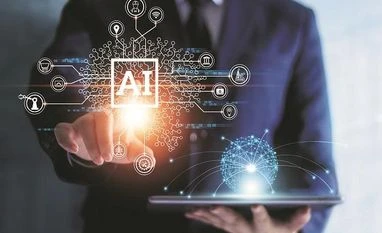Artificial intelligence (AI) is increasingly helping in the diagnosis of tuberculosis and cancer in various stages. The applications and use cases are innumerable, and, increasingly, the Indian health care sector is warming up to AI-based diagnosis and interventions.
On Tuesday, Mylab Discovery Solutions was the latest addition to this ever-growing band-wagon of use of AI in diagnostics — when it announced its partnership with Qure.ai, a provider of AI software, for medical imaging and deploy AI-enabled chest X-rays for early detection of tuberculosis (TB). Mylab’s soon-to-be-launched hand-held X-ray device MyBeam will use AI software to improve the accuracy and speed of TB diagnosis.
“Our hand-held X-ray device will strengthen our TB screening capabilities and with Qure.ai’s power of deep learning for radiology, the process will become much faster, more objective and scalable. It is a perfect example of two home grown companies coming together to contribute towards the nation’s health,” said Hasmukh Rawal, MD and co-founder, Mylab.
This is not the first time AI-enabled tools are used to diagnose TB.
In Baran district of northwestern Rajasthan, tech company Qure.ai teamed with the district hospital to deploy real-time testing of its AI-powered chest X-ray solution.
Reports suggest there was a 33 per cent increase in notification rate and the number of drop-outs of presumptive cases reduced from 72 per cent to 53 per cent.
Diagnostic players are warming up to the idea of using AI in their day-to-day operations — it improves speed without compromising on accuracy and also is a great help when the country has a limited talent pool of radiologists and pathologists.
At Metropolis Healthcare in Mumbai, 60 per cent of the pathology samples are analysed by doctors but, in a glimpse of how Artificial Intelligence (AI) is transforming the way we detect and treat diseases, around 40 per cent of the samples are being processed by AI-based platforms.
Nilesh Shah, president and chief of science and innovation at Metropolis Healthcare, had told Business Standard last year that several common tests such as complete blood count and even tests for autoimmune disorders can be done quickly and without errors using AI-enabled applications.
“The share of AI in diagnosis is only going to go up in future and this will reduce the burden on doctors, who can, in turn, devote their time to complex cases. Also, there is a huge cost benefit,” said Shah.
Some estimates suggest that around two-thirds of the people on earth do not have easy access to a radiologist. Technology and especially AI have been used to make sure that human expertise is leveraged in cases that need better attention in a faster way.
“AI helps to augment the efforts of physicians; it can do repetitive tasks tirelessly and accurately. This does not mean it would replace a clinician, but today when there is a shortage of radiologists and pathologists, AI can act as a parallel tool,” said a Mumbai-based radiologist.
In case of lung cancer, 35 per cent of the nodules are often missed in the initial screening and this late diagnosis reduces the patient’s lifespan (about 75 per cent of lung cancer patients die within 5 years).
Even pharma companies who are diversifying into digital health care to offer more holistic services to medicine buyers are using AI. Lupin, for example, is using AI actively in its digital health application Lyfe for cardiac patients.
Rajeev Sibal, president, India Region Formulations, Lupin, said during the launch of Lyfe, “Patients with chronic cardiovascular diseases experience high levels of uncertainty and require significant care and monitoring in their treatment regimen. Through our digital therapeutics platform LYFE, we are leveraging the power of human intelligence and AI or machine learning to improve patient outcomes by enhancing doctor-patient collaboration, constantly monitoring health vitals, amplifying patient awareness and improving therapy adherence.”
AI is also playing a role in disease intervention. Roche’s Accu-Chek Insight insulin pump supports automated insulin delivery. The pump is connected to a continuous glucose monitoring system. This algorithm analyses data in real time and decides whether to stop insulin delivery, adjust basal rate delivery, or deliver an automatic correction bolus when needed.
Med-tech companies are working round the clock to come up with AI-based solutions.
The Philips Innovation Campus in Bengaluru is working on customer insights to initiate front-end innovations. Siemens Healthcare and Philips have integrated AI across therapy areas like CT, MRI, and ultrasounds, etc.
Most of these med-tech firms are developing what they call “clinical decision support” tools. As med-tech innovates with new solutions, end user industries are increasingly using them for remote applications.
Krsnaa Diagnostics is setting up a tele-pathology lab in Pune and is using AI100 to digitise its entire network of pathology labs. It has tied up with Bengaluru-based SigTuple, which combines robotics and AI, to use AI-powered technology to automate the manual microscopy process across its entire pathology network.
Globally, AI-assisted digital microscopy is the way forward for pathology. Digital microscopy is the process in which physical samples are digitally imaged through a microscopic lens. This makes it possible for pathologists to review them remotely, without having to ship the samples to the reference laboratory as the digital conversion can happen at the site.
As AI becomes indispensable, the public sector is also warming up to its potential. An AI-powered system has helped pick up nearly 2,200 heart attacks across 12 districts in Maharashtra in a little over a year. It is working in a hub-and-spoke manner where the rural or district hospitals are the spokes.
As with any new technology, there are issues. Global health agencies warned recently that certain insulin pumps were prone to cyberattacks and hackers could potentially hamper the insulin delivery by accessing the device.










)

